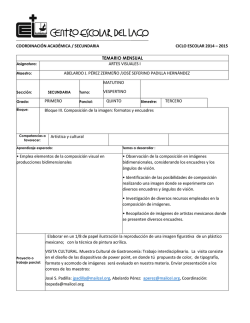
Descargar este fichero PDF - P3-USAL
LA DESCENTRACION/DECONSTRUCCION/SUPERACION DE LA TRADICION METAFISICA OCCIDENTAL Y SU IMPACTO EN LA FILOSOFIA DE LA RELIGION Investigadores USAL: Director Blanco Araujo, Alejandro ([email protected]); Miroli, Alejandro; Fiorillo Manolaki, Juan Investigadores externos: Bautista, Gabriel; Graham, Eduardo Alumnos practicantes USAL: Colom, Belén; Carou, Mariano; Columba, Claudio; Mónaco, Sofía; Maddoni, Luciano Resumen Durante siglos existió una relación íntima entre un conjunto de tesis filosóficas y el catolicismo; este conjunto de tesis han sido tributarias de una determinada situación del saber científico, de la organización política y demás. Pero desde la Modernidad esta situación ha cambiado dramáticamente, cambiando también la ubicación que las sociedades le daban a la práctica religiosa. Era de la secularización, sociedad post cristiana, laicismo radical, son términos que se han usado para describir este proceso. En él también han cambiado las tesis filosóficas, y en el comienzo del siglo XXI tenemos un encuadre filosófico radicalmente diferente. La cuestión que surge es: ¿pueden los encuadres filosóficos de la segunda modernidad o segunda revolución industrial proveer a una renovación del pensamiento de la religión como práctica social, como propuesta ética y como enseñanza salvífica? Nuestra hipótesis es que, en una serie de corrientes de la filosofía actual, existen elementos que permiten efectivamente esto. Intentaremos mostrar cómo estos encuadres filosóficos nuevos proveen elementos para una renovación del pensamiento de la religión. La perspectiva positivista heredera del Iluminismo liquidó la religión en términos de patología o superstición, descartando cualquier abordaje científico del objeto de experiencia religiosa que no sea como ilusión o proyección imaginativa. El declive de la razón moderna dio lugar a nuevos encuadres filosóficos del fenómeno religioso, en autores contemporáneos no enmarcados en la tradición metafísica. Al explorar los nuevos encuadres filosóficos, se dejó ver la estructura basal de la vivencia numínica como lo nuclear de lo religioso, en tanto experiencia constante, coextensiva a la existencia humana. Se ha logrado así mostrar el objeto de “vivencia numínica”, emancipado de la categoría “Theos” y sus derivaciones ontológicas, lo que permite incluir objetivaciones “a-teísticas” de lo numínico. Palabras clave: Vivencia; misterio; desarrollo; Dios; lo divino. 93 ANUARIO DE INVESTIGACIÓN USAL - Nro 2 (2015) Abstract For centuries there was an intimate relationship between a set of philosophical theses and catholicism; this set of theses have been tributary to a situation of scientific knowledge, political organization and more. But since Modernity, this situation has dramatically changed, also changing the location that the society gave to the religious practice. Age of secularization, post Christian society, radical secularism, are terms that have been used to describe this process. It also changed the philosophical thesis, and in the beginning of XXI century we have a radically different philosophical frame. Can the philosophical frames of the second modernity, or second industrial revolution, to provide a renewal of thought about religion as a social practice, such as ethical proposal and saving education? Our hypothesis is: in a number of currents of contemporary philosophy, there are elements that actually allow this. We try to show how these new philosophical frames provide elements for a renewal of thought about religion. The positivist perspective is heir of the Enlightenment, it liquidated the religion in terms of pathology or superstition, discarding any scientific approach to the subject of religious experience that is not an illusion or imaginative projection. The decline of modern reason, resulted in new philosophical frames of the religious phenomenon, in contemporary authors there are not framed in the metaphysical tradition. Exploring the new philosophical framing, it was seen the core of the structure of the “numinous experience” like the core of religion, like constant experience coextensive to human existence. It has managed well, show the object of the numinous experience emancipated of the category “Theos” and its ontological derivations, allowing include “a-theistic” objectifications of “the numinous”. Keywords: Life experience; mystery; development; God; the divine thing. 94
© Copyright 2026

